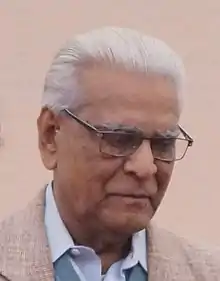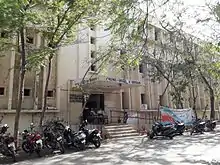Dhiru Parikh
Dhiru Ishwarlal Parikh (born 31 August 1933) is Gujarati poet, short story writer and critic from India. He is an editor of Kavilok and Kumar, a Gujarati literary magazines.
Dhiru Parikh | |
|---|---|
 Parikh in 2013 | |
| Born | Dhiru Ishwarlal Parikh 31 August 1933 Viramgam, Gujarat |
| Occupation | poet, critic, story writer |
| Language | Gujarati |
| Nationality | Indian |
| Notable awards |
|
| Spouse | Kamla Parikh (m. 1964) |
| Signature |  |
| Academic background | |
| Academic work | |
| Doctoral students | Praful Raval |
Life

Dhiru Parikh was born on 31 August 1933 at Viramgam near Ahmedabad, Gujarat, India. He completed his matriculation in 1951 from the town. He completed B.A. in 1955 from L. D. Arts College, M.A. in 1958 from Gujarat University and awarded Ph.D. in 1967 for his thesis, Rasyugma Prakruti Nirupan. Since 1955, he teaches at C. U. Shah College. He served as the principal of Mahila Arts College of Wadhwan affiliated with SNDT Women's University from 1967 to 1969. Later he joined as a professor of Department of Gujarati, School of Languages, Gujarat University in 1977, served as a head from 1986 to his retirement in 1993. He edits bimonthly, Kavilok of Gujarati poetry, since 1976 which he joined in 1969 as co-editor. He served as president of Gujarati Sahitya Parishad from December 2013 to December 2014. He also edits Kumar since 1991.[1][2][3][4]
Works
His first work published in 1951 was a short story titled Pehlu Rudan. His short story collection Kantakni Khushbo (1964) has twenty two stories. His another story collection is Parajit Vijay. Ughad (1979) is a collection of poetry. Ang Pachisi (1982) is a collection of twenty five traditional Chhappa styled sarcastic poems. Aagiya (1982) is a collection of haiku. His other poetry collections are Hari Chadya Adfete, Shikhare Betha Sthitipragnya (2003), Station ane Train (2007).[3][1]
He wrote biography of Rajendra Shah under Gujarati Granthkar Shreni and published in 1977. Rasyug ma Prakritinirupan (Nature in medieval literature of Raas, 1978) is his research thesis. Atratya Tatratya (1978) is a collection of introductory essays on poets which include Gujarati poets along with C. K. Louis, W. H. Auden, Pablo Neruda, Eugenio Montale and Yevgeny Yevtushenko. Narsinh Mehta (1981) is a biography of Narsinh Mehta. Kharakshar (1982) has short introduction of several Gujarati authors including Dayaram, Dalpatram, Narmad, Priyakant Maniyar, Jagdish Joshi, Manilal Desai. Kaalma Korya Naam (1977) is a collection of short biographies including Yasunari Kawabata, Ishwar Chandra Vidyasagar, Charles Dickens, Dalpatram, Pujya Mota.[3][1]
Samkalin Kavio (1983) is criticism of poetry of contemporary poets including Labhshankar Thakar, Sitanshu Yashaschandra, Rajendra Shukla, Ravji Patel, Adil Mansuri. Paravartan (1985), Prayogshil Sarjak Nhanalal (1987), Amar Brahmana Alokma, Ubhayanvaya (1986) are works of criticism. He edited several books Nishkulanand Padavali (1981), Saar Mahakavyo (1983), Panch Mahakavyo (1984) and T. S. Eliot (1989). Tulnatmak Sahitya (1984) is a work on comparative literature. He translated Divine Comedy in 1985.[3][1]
Awards
He was awarded Kumar Chandrak in 1971, Swami Sachchidanand Sanman in 2004, Premanand Suvarna Chandrak in 2006 and Ranjitram Suvarna Chandrak in 2008.[1][2][3]
See also
References
- Brahmabhatt, Prasad (2010). અર્વાચીન ગુજરાતી સાહિત્યનો ઈતિહાસ - આધુનિક અને અનુઆધુનિક યુગ (History of Modern Gujarati Literature – Modern and Postmodern Era) (in Gujarati). Ahmedabad: Parshwa Publication. pp. 320–322. ISBN 978-93-5108-247-7.
- "Dhirubhai Parikh becomes new President of Gujarati Sahitya Parishad". DeshGujarat. December 24, 2013. Retrieved May 10, 2014.
- "Dhirubhai Parikh" (in Gujarati). Gujarati Sahitya Parishad. Retrieved 28 March 2015.
- Khan, Saeed (18 August 2013). "Master of metre". The Times of India. Retrieved 28 March 2015.
- Rye, Madhu, ed. (December 2017). "Kantak Ni Khushboo (Short story by Dhiru Parikh)". Mamta. New Jersey: Chandramani Prakashan. p. 15.
External links
- Dhiru Parikh on GujLit